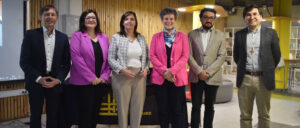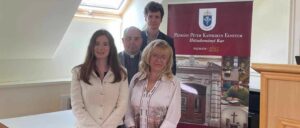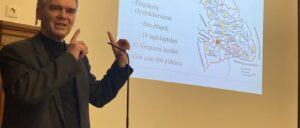Our doctoral school is the third cycle of study of the Faculty of Roman-Catholic Theology of the Babeș-Bolyai University, after the bachelor and master programs in theology. Its administrative organization is part of the UBB Doctoral Institute. The doctoral studies are regulated by an order approved by the Romanian Ministry of Education. In this regard, doctoral studies are divided into two parts, called programs, which are usually structured for a total duration of three years, i.e. six semesters. The educational curriculum organized at institutional level ensures the acquisition of theoretical knowledge, while the research content enables and supports independent research activity.

Diverse open spaces of community life - a visit to two Catholic universities in Latin America
In the framework of a development project, a delegation from our Doctoral School visited the Catholic University of East Africa and Tangaza College in Nairobi, the capital of Kenya, in January 2023, and four Catholic higher education institutions in Manila and Tagaytay in the Philippines in South East Asia in the spring of 2023. In...
International Doctoral Conference PPKE - 2024.05.23
4 doctoral students, László Ambrus, Orsolya Dani (Pál-Jakab), Hunor Gál and Edit-Rozália Péter represented the Doctoral School of Religion, Culture and Society at the conference held at the Faculty of Theology of the Hungarian University of Applied Sciences in Budapest.
Sapientia Free University - Religious freedom in Torda and Catholic autonomy
In the framework of the Sapientia Free University organized by Sapientia College of Theology of Religious Orders Budapest, Dr. László Holló gave a lecture on 11 April 2024 on the topic of Religious Freedom and Catholic Autonomy in Torda.
Synodality, women and church leadership
Meeting on 2 April 2024 at the Catholic University of Santiago Silva Henríquez, Chile, from 16.00 Eastern European Time.In the framework of the meeting, our colleague Klára Csiszár will present the summary report of the first session of the 16th General Assembly of the Synod on Synodality.

Two new habilitations in our doctoral school
Two professors of the Faculty of Greek-Catholic Theology of the Babeș-Bolyai University defended their habilitation theses in the framework of our Doctoral School of Religion, Culture and Society. Dr. Cristian Barta, professor, successfully habilitated on 19 January 2024 on the topic "Fundamental theology and dogmatics in the Romanian Greek Catholic Church united with Rome: tradition,...Updates
Religion, Culture, Society - Doctoral School
Our Mission
-
Religion
The role of religion in the lives of people and societies has changed significantly in recent decades. We explore different aspects and consequences of this change. -
Culture
A human being always lives in a culture. Grace presupposes culture, and the gospel always seeks to be realized in a culture. We are searching for the possibilities and barriers to this realization. -
Society
Society is constantly changing. It faces many challenges along the way. These challenges cannot leave the Church indifferent. In a given society, the Church always seeks to be an advocate for the poor and the weak. We have seen many examples of this throughout history. Our research covers the realities of the past as well as the challenges of the present.
Research fields
Research projects







